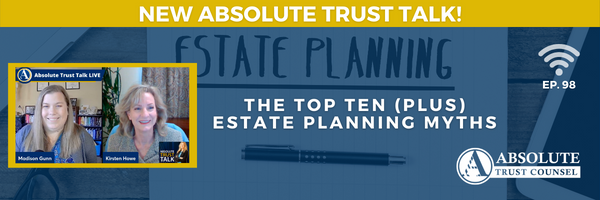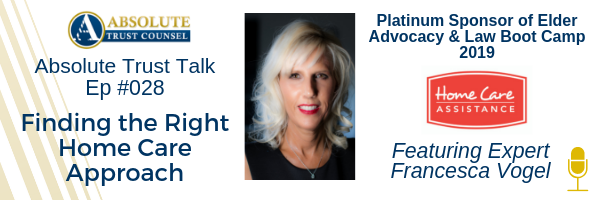In this episode of Absolute Trust Talk, hosts Kirsten Howe and Jessica Colbert delve into the latest twist in O.J. Simpson’s long-running estate saga. The estate’s executor has taken an unexpected step by filing a lawsuit against one of Simpson’s heirs, claiming that a key Las Vegas property was secretly transferred out of the estate’s control. As they speculate on the case, the hosts examine the potential motives behind this action—such as the strategic use of an LLC and homestead exemptions—and the significant implications for addressing Simpson’s mounting debts, including those owed to the IRS. With a thorough exploration of the executor’s critical role in managing and safeguarding estate assets, this episode is a powerful reminder of the complexities and repercussions of poorly executed estate planning. Whether you’re drawn to high-profile legal drama or seeking insights to protect your legacy, this discussion provides valuable lessons for anyone navigating the intricate world of estate administration.
Time-stamped Show Notes:
0:00 Introduction
0:38 O.J.’s executor files a lawsuit against his son, Justin, alleging that a scheme was used—via an LLC—to shift ownership of O.J.’s Las Vegas home.
1:44 Next, Kirsten and Jessica dive into the discussion of the executor’s responsibility to marshal assets, ensuring funds return to the estate, and an explanation of why attorney and administrative fees come before creditor and beneficiary payments.
4:18 Do you know about the Homestead Exemption? Listen in to explore how homestead exemptions protect home equity and their potential impact in this case.
6:06 Here, the discussion shifts to whether forming an LLC was a tactic to shield the property from IRS claims and the implications of such a move.
6:45 Finally, Kirsten and Jessica analyze the uncertainty surrounding Justin’s actions and the possible motives behind the alleged asset transfer.
Transcript:
Hello, and welcome to Absolute Trust Talk! This is our video podcast at Absolute Trust Council. I’m Kirsten Howe, and I’m joined by my associate attorney, Jessica Colbert. We’re here to discuss one of our favorite topics on Absolute Trust Talk—well, at least one of my favorites. We will talk about celebrity gossip related to celebrity estate plans and estate administrations. Additionally, we’ll revisit one of our favorite cases that we’ve been following for a couple of years: the O.J. Simpson case. This is particularly relevant right now because just last week, O.J.’s executor filed a lawsuit against one of his children. Jessica, can you tell us more about this lawsuit?
This lawsuit pertains to O.J.’s Las Vegas home. The executor claims that O.J.’s son, Justin, may have convinced O.J. to either take title of the home in the name of an entity, specifically an LLC, or to transfer the title in a way that designates Justin as the 100% owner of the property. To clarify for anyone from O.J.’s estate or Justin’s family who might be listening: this is purely speculation. We base this on what we’ve heard, without making any accusations. However, according to the lawsuit, Justin is the 100% owner of an entity that holds the home O.J. was living in at the time of his death. The executor contends that any existing home equity is funds that should revert to the probate estate. O.J. made the down payment, paid the mortgage, and the home’s value has increased since its purchase; therefore, those funds must be returned to the probate estate. This forms the foundation of the allegation.
Yes, the executor has a responsibility. The reason he’s trying to ensure that whatever he says about O.J., the owner of this house, and whatever he’s entitled to, needs to be returned to the estate is that part of the executor’s role is what we call marshaling the assets. This involves gathering all the assets into the estate to be managed during the administration. The executor collects the assets, and then the judge decides what happens to them and how they get distributed. However, before anything goes to any children or beneficiaries, creditors take precedence. We know O.J. had many creditors. That’s correct; he owed well over $100 million at the time of his death to the Goldman family. They obtained a civil judgment against him for killing their son, Ron Goldman, and that debt continued to grow over the years as O.J. never paid it. So, that was his biggest creditor. The executor’s role is to recover funds to ensure they go to those who are entitled. However, that responsibility actually falls to the judge, not the executor. As Jessica mentioned, creditors don’t actually come first. The attorney comes first. The executor and the attorney manage the expenses of administration, and then whatever remains goes to the creditors. If there’s anything left after that, then the beneficiaries receive their share.
That’s right. Let’s discuss this LLC and why it might have seemed like a good idea.
Yeah, it’s, well, first I need to discuss something else called homestead. I’m not sure if every state has this, but California does, and Nevada as well. Many states have it. It’s a law stating that a creditor cannot take your home. There’s a homestead exemption amount that varies by state. This exemption protects a certain amount of home equity from creditors. In Nevada, that amount is $605,000. From what we read about this lawsuit, there was a mortgage on the property. So, even if O.J. owned it, he didn’t have 100% home equity. It’s possible that the $605,000 homestead exemption would have protected whatever O.J. actually owned. For instance, if the house is worth a million but O.J. had a $400,000 mortgage, that $605,000 exemption covers all the equity O.J. had. It’s possible he didn’t need this LLC for that reason because his homestead exemption would have safeguarded him from creditors. However, it was meant to shield him from all creditors, and we are specifically talking about the IRS here. We know you never want to have the IRS on your back. You don’t want to owe that money because the IRS is considered a super creditor. This means the IRS can still get paid even when other creditors, like the Goldman family, wouldn’t be able to. The IRS gets priority, right? So, forming the LLC might have seemed like the only way for this home to belong to O.J. while keeping it out of the IRS’s reach. If this entity was properly managed as a separate entity—not just O.J.’s personal asset—and if it wasn’t set
Yeah, and again, you know, we’re just gossiping and speculating here. But you know, Justin is allegedly living in the house now, and he’s refusing to give the money back to the executor, which, if this is something that Justin and O.J. had worked out and planned to do, doesn’t really make sense that he would now refuse to return it to the estate.
Yeah, I guess that’s true. If the goal was to protect O.J. while he was alive from the IRS, then now that he’s gone, the IRS can collect their money. And what difference does it make? It’s not helping O.J. anymore. If what Justin did was for that purpose, you’d think he would return the money to the estate; I don’t know, maybe not. Another concerning point is that if he was trying to protect it from the IRS to spare O.J. from worrying about them, he could have at least made O.J. an owner of the LLC. He didn’t have to be the 100% owner of the LLC.
Yeah, but it’s possible that O.J. knew he was doing it this way—making Justin a 100% owner—so that when O.J. died, the house would belong to his family and not revert to the IRS.
Oh, yeah, that’s another way to look at it. So, we won’t know until we know; I’m sure there are seven other ways to view a whole range of different things we haven’t even considered. It’s an interesting case, and it’ll be intriguing to see what happens next. Maybe, with this public attention on it, Justin will decide this isn’t a battle worth fighting. I’m just going to, you know, let it go. I don’t want it. I don’t know. We’ll see. If anything comes up in the coming weeks or months, you’ll hear about it here on Absolute Trust Talk. Yeah. Okay. Thank you, Jessica, and thank you to the audience for tuning in. I hope if you didn’t learn anything, at least you enjoyed it, and we look forward to connecting with you next time.
Resources Related to This Episode:
- Absolute Trust Talk Episode 160: Celebrity Probate Case Files: O.J. Simpson https://absolutetrustcounsel.com/160-celebrity-probate-case-files-O.-J.-simpson/
- Absolute Trust Talk Episode 130: Exploring the O.J. Simpson Estate: Probate and Creditor Claims https://absolutetrustcounsel.com/130-exploring-the-O.J.-simpson-estate-probate-and-creditor-claims/
- Absolute Trust Talk Ep. 125: Cher Files for Conservatorship of Son Elijah Blue Allman Over Alleged Substance Abuse: https://absolutetrustcounsel.com/125-cher-files-for-conservatorship-of-son-elijah-blue-allman-over-alleged-substance-abuse/
- Absolute Trust Talk Ep. 124: Beach Boys Founder Brian Wilson Suffering from Dementia as Reps Seek Conservatorship: https://absolutetrustcounsel.com/124-beach-boys-founder-brian-wilson-suffering-from-dementia-as-reps-seek-conservatorship/
- Absolute Trust Talk Ep. 122 – The Costly Truth of Ignoring Estate Planning Like Jay Leno: https://absolutetrustcounsel.com/122-the-costly-truth-of-ignoring-estate-planning-like-jay-leno/
- Absolute Trust Talk Ep. 117 – Estate Planning Lessons: Senator Dianne Feinstein: https://absolutetrustcounsel.com/117-estate-planning-lessons-senator-dianne-feinstein/
- Absolute Trust Talk Ep. 113 – How to Avoid a Chaotic “Casey Kasem” Estate Plan?: https://absolutetrustcounsel.com/113-how-to-avoid-a-chaotic-casey-kasem-estate-plan/
- Absolute Trust Talk Ep. 106 – What’s Left of the Presley Estate? Lessons Learned from Elvis & Lisa Marie: https://absolutetrustcounsel.com/106-whats-left-of-the-presley-estate-lessons-learned-from-elvis-lisa-marie/
- Absolute Trust Talk Ep. 097 – Estate Planning Lessons from the Rich and Famous: https://absolutetrustcounsel.com/097-estate-planning-lessons-from-the-rich-and-famous/
- Death and Estate Taxes Don’t Take Holidays, Even for Celebrities – A carefully crafted estate plan may have avoided the multi-million dollar battle over Michael Jackson’s estate: https://absolutetrustcounsel.com/death-estate-taxes-dont-take-holidays-even-celebrities/.
- From Prince to Pauper? What happens if you die without an estate plan? If you’re the late rock star, Prince, you lose half of your estate to state and federal estate taxes: https://absolutetrustcounsel.com/from-prince-to-pauper/
- Debbie Reynolds and Carrie Fisher’s Deaths Give Offspring Millions to Inherit Overnight – Losing two generations back-to-back will strain even the most robust estate plan: https://absolutetrustcounsel.com/essential_grid/debbie-reynolds-carrie-fishers-deaths-give-offspring-millions-inherit-overnight/
- Nichelle Nichols Conservatorship Battle Sheds Light on Estate Planning for Incapacity: https://absolutetrustcounsel.com/essential_grid/nichelle-nichols-conservatorship-battle-sheds-light-on-estate-plannning-for-incapacity/
- Estate Planning Lessons, Celebrity Edition – Nichelle Nichols: https://absolutetrustcounsel.com/estate-planning-lessons-celebrity-edition-nichelle-nichols/
- Bill Paxton’s Death Sheds a New Light on Pre-Surgery Estate Planning Essentials: https://absolutetrustcounsel.com/essential_grid/bill-paxtons-death-sheds-new-light-pre-surgery-estate-planning-essentials/
- A Will is Not Enough – Securing Your Legacy with Estate Planning Life can change in an instant. A will is not enough to be prepared. Get free access to our actionable E-book Guidebook #1 and start protecting your legacy today. https://absolutetrustcounsel.com/guidebooks/
- Learn how to comfortably define gray areas and assess your unique needs to build a secure future now effortlessly. Check out Guidebook #2, Estate Planning Beyond the Basics, here > https://absolutetrustcounsel.com/guidebooks/
- Get our free introductory guide to the most used estate planning tool, family trusts, and understand how we plan to help protect your family. Guidebook #3: https://absolutetrustcounsel.com/guidebooks/
- Absolute Trust Counsel would love to offer access to our Incapacity Planning resource page: https://AbsoluteTrustCounsel.com/Incapacity-Planning/. We’ve collected our top planning information all in one place so listeners can find videos, guidebooks, blog posts, and a host of information with tips and strategies on implementing, planning, and protecting themselves and their loved ones.
- We’re pleased to provide a library of e-books to address common estate planning questions and concerns in practical, easy-to-understand language. https://AbsoluteTrustCounsel.com/Resources/.
- ASK KIRSTEN: If you’d like Kirsten to answer your question on the air, please email her at Info@AbsoluteTrustCounsel.com.
[AD] Estate planning addresses many vital factors about your future and legacy. Where do you get started if you don’t have an estate plan? If you do, how have new laws and life transitions changed? Will your plan still protect you? Regardless, you deserve control over your wants, needs, goals, and hopes for the future. We can help you understand your options and, legally, how you will best be protected at all touchpoints. Get started today by scheduling a free discovery call so we can discuss your needs. Visit https://absolutetrustcounsel.com/scheduling/ or call us at (925) 943-2740.


